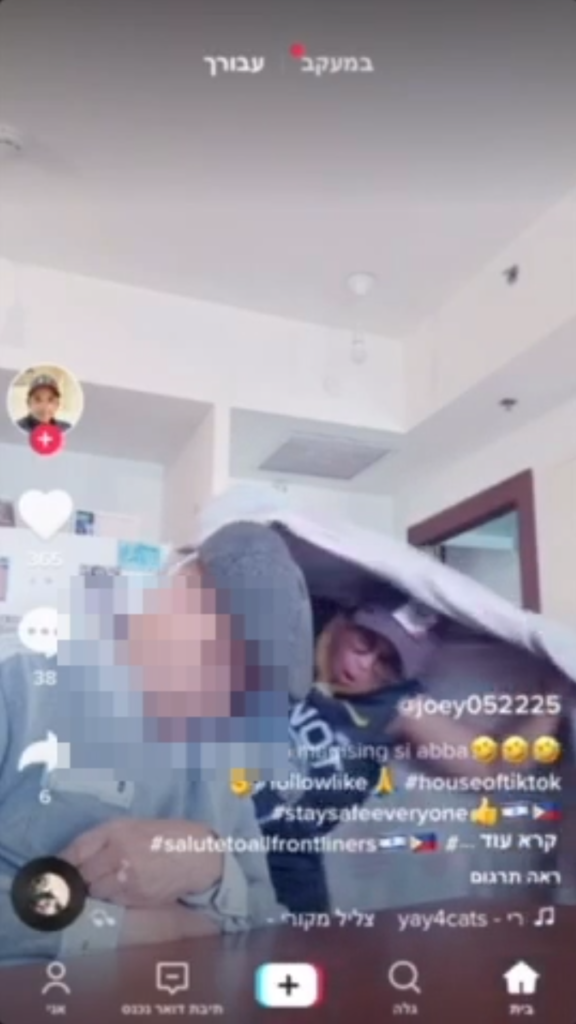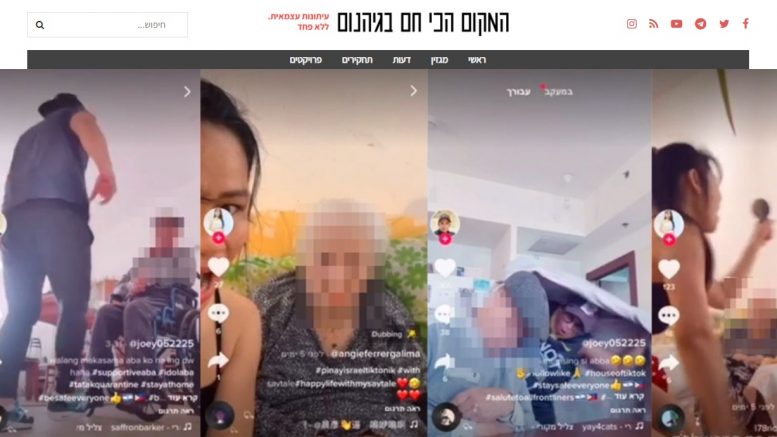Translation from from Hebrew Language
Exposure: Nursing caregivers upload videos on Tiktok that ridicule the elderly and violate their privacy
written by: Linoy Bar Geffen
https://www.ha-makom.co.il
Date: June 30, 2020
A Filipino caregiver dances to the sounds of joyful music, with an elderly man sitting in the background who does not understand or is shocked by what is happening: this is what dozens of tiktoking videos of foreign caregivers in Israel look like. The Ministry of Welfare is investigating the matter, and a criminal case has already been opened in the matter.
Angelina (pseudonym) probably really likes to shoot tiktoking videos, because she stars in quite a few of them. She appears on screen in a tiny, tight dress: a spaghetti tank top and shorts, with cheerful music in the background, sometimes in English and sometimes in Tagalog. She shakes her ass in a networking dance in front of the cellphone camera, turns around, smiles excessively, pulls a strand of hair.
This video could have been another one of millions of similar videos of young women in Tiktok, but Angelina lives and works in Israel as a nurse, and she also brings the work to the social network: in the video, an elderly woman is seen sitting in an armchair The same woman who believes in her safety and privacy.
The elderly woman stares at Angelina with an expression that looks surprised and confused. Angelina approaches the elderly woman and sneezes in front of her face. She points at her and giggles, as if it were a circus bear dancing or a bizarre object.
Angelina is one drop in the sea of videos of caregivers documenting themselves and their patients without any permission from the patients or their family members. The format is quite fixed: the therapist dances or performs excessive movements in front of the patient to the sounds of joyful music, when it is also clear to the layman that the patient does not understand what is happening in front of him and is shocked by what is happening.
A pet in Tagalog
In one of the videos I saw the documented elderly woman sitting on a couch in the posture of a man who had lost consciousness and his body had fallen forward. Being in such a posture for long minutes would cause her pain.
My reflex as a spectator caring for a nursing disabled person was to wonder why no one is laying the patient on the couch or putting her to bed, but instead I have to watch the elderly woman’s caregiver dance in front of the camera with cheerful giggles.
In another video the camera focuses on an elderly man lying on a single bed screaming for help. The caregiver approaches him, but instead of offering him help she documents herself making faces at the camera.
The camera focuses on an elderly man crying out for help. The caregiver approaches him, but instead of offering him help, she documents herself making faces at the camera.
The trend for these videos in Tiktok is called PEP, a pet in Tagalog, the language spoken in the Philippines. PEP is also the nickname that some therapists use in internal conversations and the vibrant Facebook groups they run, to define their patients.
The therapists add tags to videos that are an indication that they were taken in Israel: place of residence and words in Hebrew written in English (SAVTALE). There is no limit to viewing the videos – they are visible to all.
A feeling of physical terror
I would like to deviate for a moment from the usual writing pattern in articles that seek to bring news interest to the public’s attention, because I am unable to watch these videos with the required journalistic composure. The viewing experience was one of the most chilling and disgusting I have ever experienced.
I spent hundreds, maybe even thousands of hours with nursing patients and witnessed countless situations with elderly and young patients in which I was exposed to the various aspects of body betrayal and its deformities.
Indeed, over time what is terrifying for the first few times becomes a daily routine, but the thought that these situations will be documented and broadcast to millions of viewers is the nightmare of every person whose heart is dear to the patient.
The thought that these situations will be documented and broadcast to millions of viewers is the nightmare of every person whose patient is dear to his heart.
Watching these videos I could not help but imagine my beloved documented by his veteran therapist in awkward situations without our knowledge and approval, and the feeling of horror was really physical.
“Do you know these videos?” I asked the therapist. “Yes, everyone knows,” he replied awkwardly. “Do you think they understand that this is a criminal offense?”. He stuttered that he did not personally know the caregivers and did not know what they did or did not understand.
Weak reference
One of the members of a group of activists with disabilities that I assist in the “Public Press Movement” and Link 20, was the first to inform me of the existence of the videos. Like me, she was horrified. “We must contact the Ministry of Welfare and the Population Authority,” we told each other in the group, not knowing that such an application had already been made weeks ago and had received weak attention.

The appellant was Eitan Binyamin, who founded and heads the “Israeli Lobby for the Elderly.” Benjamin became acquainted with the videos as they began to be circulated in Facebook groups of patients and their families.
Benjamin is not a young man. Social networks like Tiktok are not part of his daily routine. However, he had no trouble locating dozens of such videos. Even the hottest place researcher, Masha Averbuch, easily located similar videos when we started researching the subject.
“This issue has become serious and is contrary to the Protection of Privacy Law and the Basic Law of Human Dignity and Liberty,” Benjamin explains. “It is not for nothing that the legislature’s rate in section 5 of the Privacy Protection Law, 1981, a maximum penalty for invasion of privacy made intentionally of five years imprisonment, this, to emphasize the great importance of a person’s privacy, easy and material that they are helpless.”
Shocked and shocked, Benjamin hurried a few weeks ago to the two factors he identified as supposed to stop the phenomenon: Adv. Inbal Meshesh, head of foreign workers at the Population Authority and officials at the Ministry of Welfare. That their loved ones may also be exposed in this degrading way.
According to him, in a meeting with Meshash, he felt that she was mainly trying to point out the problems in dealing with the issue: “How can I be sure that it was actually filmed in Israel? And how can I even locate these caregivers?”.

Benjamin tried to continue to provoke Meshash to action, but she severed ties with him and did not respond to his inquiries. At the same time, we contacted the Ministry of Welfare on behalf of the hottest place, who asked to see the videos and said that they were investigating the issue. We also learned that a complaint was filed following one of the videos in the Jerusalem police, and a criminal case is being filed against one of the camera workers.
We contacted the facts and the employees photographing in Tiktok for clarification, in a private message in Tiktok, but we have not yet received a response. We also do not know if some of the seniors confirm their participation in these videos, or are aware of the use made of them, but a glance at these videos, raises a grave concern that this was done without their consent.
The Immigration and Population Authority responded: “The law in Israel treats every violation and invasion of privacy as defined in the Privacy Protection Law, including invasion of privacy of a nursing patient and caregivers. However, as already explained that in case of invasion of privacy, every criminal offense Contact the Israel Police.
“We will clarify that the authority condemns any invasion of patients’ privacy and we do not take lightly these phenomena. At a meeting held this month, it was clarified to the representative of the Israeli Lobby for the Elderly what the authority’s position is on the issue and what actions will be taken later.”
Arnon Elhanani, from the Association of Nursing Companies: “In employment contracts, all caregivers sign confidentiality and the protection of privacy, so there is no legal issue here that remains open. The National Insurance Nursing Service will distribute a letter asking the service providers to take care of this, and raise awareness of the matter. “
